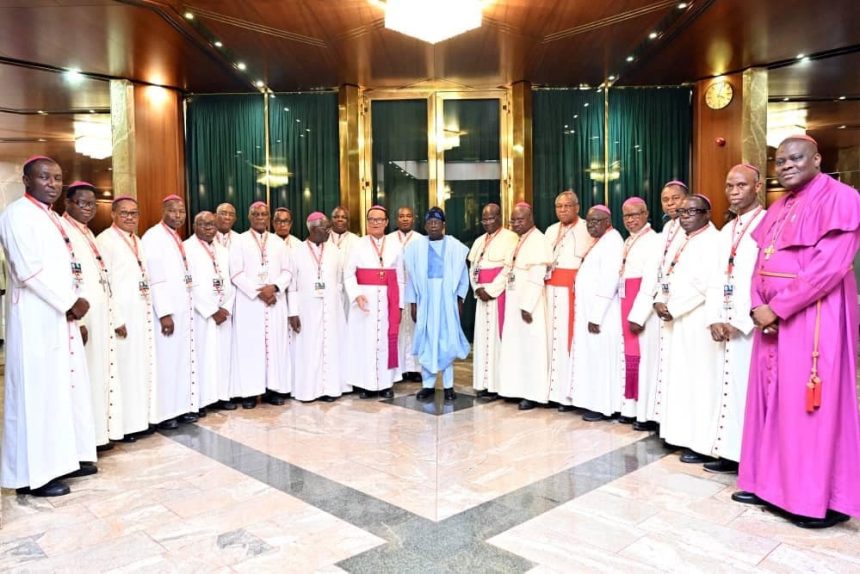President Bola Tinubu has acknowledged the challenges faced by Nigerians amid ongoing economic reforms but emphasized that these measures are essential to building a resilient nation and securing a prosperous future for generations to come.
The President made these remarks on Friday in Abuja during a meeting with a delegation from the Catholic Bishops’ Conference of Nigeria (CBCN). He stressed the importance of collective investment in the nation’s development, noting that poverty transcends religious boundaries and requires a unified approach to combat.
“I understand the difficulties Nigerians are facing, but these reforms are necessary to safeguard our future. The removal of fuel subsidies was a tough decision, but it was a necessary step to prevent the bankruptcy of our nation. We cannot continue to spend the resources meant for future generations,” President Tinubu stated.
He further emphasized that poverty affects everyone, regardless of religion, and called for a united effort to address it. “Poverty has no religious identity. It impacts all of us, and we must fight it together. The tax reforms we are implementing present an opportunity for citizens to invest in the growth of our nation,” he added.
Responding to the bishops’ request for the return of mission schools, President Tinubu clarified that schools fall under the jurisdiction of state governments, not the federal government. He cited his tenure as Lagos State governor, where he returned mission schools to their original owners, as an example of his commitment to such initiatives.
The President also commended the Catholic Church for its contributions to education and healthcare. He highlighted the establishment of the Nigerian Education Loan Fund (NELFUND) to ensure that no student drops out of school due to financial constraints. He pledged to explore ways to extend similar support to students in private institutions not covered by NELFUND.
On the issue of insecurity, President Tinubu assured the delegation that security agencies are making significant progress in addressing the nation’s challenges. He reiterated that insecurity affects all citizens, regardless of religious affiliation, and called for unity in overcoming these challenges.
“Insecurity impacts everyone—Christians and Muslims alike. I have no religious bias; my wife is a pastor in the Redeemed Christian Church of God. We must prioritize the development of our nation above religious divisions. My door is always open for dialogue and collaboration,” he said.
The President expressed gratitude for the prayers and support of religious leaders, noting that the country is beginning to see positive outcomes from the reforms. He highlighted increased investment in the petroleum sector, improved agricultural yields, and a decline in commodity prices as signs of progress.
“There is hope. Investors are coming into Nigeria, and they are speaking positively about our country. What seemed like a difficult start is now showing promise. We are not yet at halftime, but I am optimistic about the future,” he said.
Most Reverend Lucius Iwejuru Ugorji, Archbishop of Owerri and President of the CBCN, led the delegation of 20 bishops to the State House. He congratulated President Tinubu on his electoral victory and commended his administration’s efforts to reposition the country.
“Your government’s mantra of ‘Renewed Hope’ aligns with the theme of hope declared by Pope Francis for this Jubilee Year. We are here to share the fruits of our deliberations and offer our support,” Archbishop Ugorji said.
While acknowledging the hardships caused by the removal of fuel subsidies, the bishops praised the tax reform initiative as a long-term strategy to generate resources for national development. They also called for intensified efforts to address insecurity and restore public confidence.
The CBCN emphasized the need for religion to serve as a unifying force, promoting moral integrity and patriotic unity without infringing on individual rights. They also urged the government to disengage from sponsoring religious pilgrimages, citing inefficiency and corruption in the current system.
“Public funds should be redirected to pressing national needs. Religious groups should take full responsibility for organizing pilgrimages to ensure greater accountability,” Archbishop Ugorji stated.
The Minister of Information and National Orientation, Idris Mohammed, echoed the President’s sentiments, noting that temporary hardships are often part of the reform process. He highlighted the improved security situation and the government’s commitment to reclaiming national values through initiatives like the National Value Charter.
“The reforms are yielding results. Today, it is safer to travel from Abuja to Kaduna, and farmers are returning to their fields. We are also working to reintroduce civic education and religious teachings in schools to foster unity and moral values,” Mohammed said.











